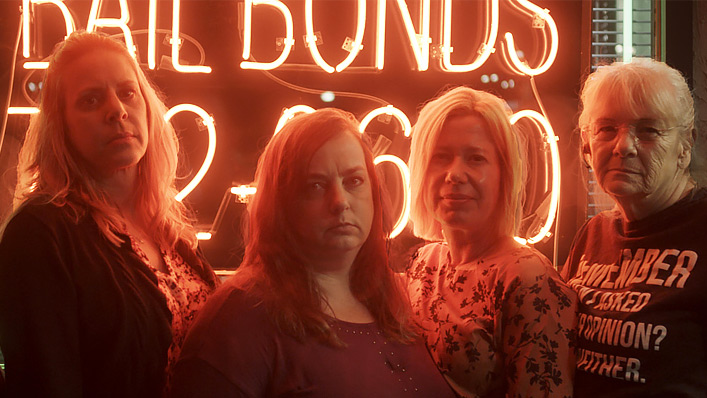Love Fraud is an addictive series about the hunt for a serial heartbreaker

A long-form documentary exposé fuelled by an urge for justice, Love Fraud (now on Stan) is a gripping series about heartbreak and deceit, writes Eliza Janssen.
Richard Scott Smith is a real-life supervillain; look, he even has the ‘two first names’ thing that so many serial killers inexplicably have. The titular scam artist at the centre of Stan’s new docuseries Love Fraud, Smith used internet dating to ruin the lives of dozens of women. Now we get to watch as a documentary crew and a wizened, badass Kansas City bounty hunter named Carla bring him down.
Directed by Jesus Camp filmmakers Rachel Grady and Heidi Ewing, Love Fraud features the same unflinching view of the American South, lingering on the most miserable and cringeworthy details of Smith and his victim’s stories. Most of Grady and Ewing’s subjects begin by relating their fairytale introduction to Smith, whose ‘kind eyes’ and eagerness to ‘settle down’ won them over. Lush animations from artist Martin O’Neill and animator Andrew Griffin remix photos of Smith and his women to convey these accounts visually, in gorgeous vignettes that are somewhat reminiscent of romantic Bond movie title sequences.
To the viewer, however, Smith is completely unremarkable; a pudgy white guy with a pathetic talent for making himself out to be the victim in any given scenario. Part of the documentary’s ambition is to pin down just how Smith accumulated such a staggering number of wives (the number may be in the double digits). Unlike in splashy series such as Catfish or Dirty John, the central conman doesn’t seem to have any special charms or huge overarching lies about his lifestyle with which to draw in his prey. What is it about this guy?
“When he met me, he was on his way to Guatemala!” one ex-girlfriend cackles at a union of Smith’s victims, all of whom know him by different names. Sometimes Mickey, sometimes Scott, sometimes Rick. When the women meet, they commiserate and even laugh about the overlapping lies they’ve all been told by Smith, some of which have been chronicled in a scathing blog set up to warn new victims away. But it’s not enough. As the documentary crew gets closer and closer to Smith’s current location, they encounter his latest girlfriends: women who still appear to be under his spell, and who even harbour him as a criminal fugitive from his domestic abuse and fraud warrants.
While Grady and Ewing are highly considerate of their subjects’ wounds, the women themselves can tend towards self-destructive victim blaming. Carla, the tough-as-nails bounty hunter who posits herself as the women’s saviour, keeps cruelly pointing out that each of his victims should’ve heeded the red flags earlier. Jean, one of his first wives, defends herself, saying: “You don’t understand. If you’re out there dating in the real world, there’s nobody out there.”
That desperation and loneliness is central to Love Fraud’s storytelling, but also its aesthetic, with plenty of knowing scenes set at sad karaoke bars and a dingy seafood restaurant called Krab Kings, which Smith may have roped multiple women into funding.
Thrillingly, in its final episodes the series becomes a true game of cat-and-mouse, as the investigation’s interviews with spurned husbands left cuckolded by Smith begin to circle in on the man himself. Of course the filmmaker’s climactic confrontation with Smith can never be as dramatic as its suspenseful build-up, but it’s still certain to shock viewers who have been scandalised by the previous four hours of heartbreak and deceit. While Rick or Mickey or whoever might be a villainous pile of lies in the form of a human man, Love Fraud is the real deal; a long-form documentary expose fuelled by an addictive urge for justice.
















